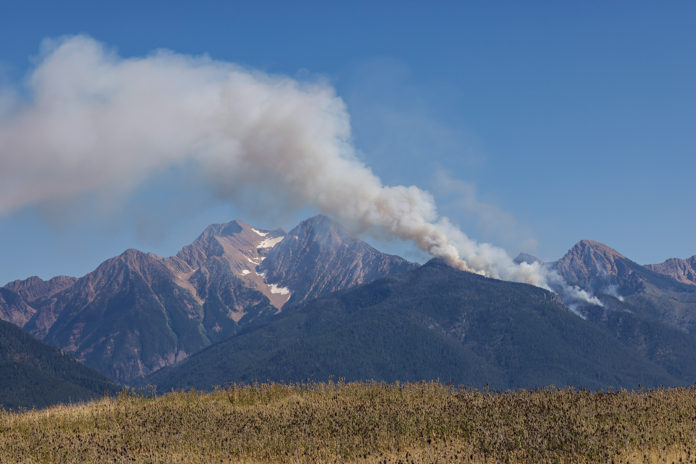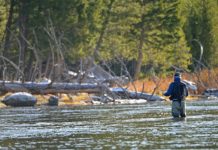Kian Tanner grew up in Bigfork, on a serene 27-acre slice of the Flathead Valley shaded in by birch, spruce, aspen and fir trees and bordered by a bubbling creek. After moving to Bigfork from the Yaak at just six months old, Tanner’s childhood was shaped by the all-powerful natural landscapes the Flathead boasts. From his earliest years, Tanner recalls fond memories of fly fishing on the Flathead River, trekking to view glacial formations in Glacier National Park and hiking and camping in Montana’s forests.
Now, he says, both literally and figuratively, it’s all going up in flames.
At 17 years old, Tanner is one of the 16 youth plaintiffs involved in Held v. State of Montana, an ongoing lawsuit alleging that by continually bolstering the fossil fuel industry, the state of Montana has contributed to the climate crisis, violating the plaintiffs’ constitutional rights to a clean and healthy environment.
Last August, a landmark decision by Judge Kathy Seeley permitted the plaintiffs to proceed to trial, a surprising victory given that state and federal courts have dismissed many similar lawsuits in recent years. As extreme climate events continue to rattle the Flathead this summer, Held’s plaintiffs and lawyers look ahead to their trial, which they hope will prove effective in securing a safer future for Montana’s children.
Tanner and the other plaintiffs are represented by attorney Nathan Bellinger of Our Children’s Trust, as well as Roger Sullivan and Dustin Leftridge of Kalispell’s McGarvey Law and Barbara Chillcott and Melissa Hornbein of the Helena-based Western Environmental Law Center. Our Children’s Trust is an Oregon-based nonprofit public interest law firm that litigates a wide array of youth-based climate lawsuits.
The lawsuit hinges on two main statutes — provisions of Montana’s state energy policy that explicitly promote the use of fossil fuels and a provision of the Montana Environmental Policy Act, which prevents the state from considering how the state’s projects contribute to climate change. If Held is successful in proving these provisions to be unconstitutional, Bellinger said, the state will be required to evaluate how its projects exacerbate climate change and will no longer be able to unequivocally promote fossil fuel use.
For Bellinger, the legal route to climate solutions, though paved with institutional roadblocks, may be one of the only legitimate avenues left for change, as legislators remain unwilling to act on the crisis.
“We have known about the dangers of climate change for many decades. During that long timeframe, our political branches have both failed to respond to the threat of climate change with the necessary urgency, and at the same time, they have actually continued to act in ways that further exacerbate the climate crisis by passing legislation that promotes fossil fuels,” Bellinger said. “It’s not only appropriate, but I would argue it necessary, to turn to the courts as an independent third branch of government.”
Ultimately, Bellinger emphasized, “The political branches cannot evaluate the constitutionality of their own conduct.”
Held v. Montana is far from the only climate case presently in litigation. There are currently 2,088 climate cases in the world, according to the Grantham Research Institute on Climate Change and the Environment, 1,476 of which are in the United States. Many have included children as plaintiffs, who are slated to inherit the worst of the expediting crisis in the coming years.
“Whether you’re 12 or 14 or 17 [years old], the year 2050 isn’t really that far away,” Bellinger said. “These really dire climate predictions are expected to take place while they’re not even that old.”
Without significant climate action, scientists have predicted 10 to 12 inches of sea level rise, 10% crop losses, increased days each year over 90 degrees and trillions of dollars in infrastructure damage by the year 2050.
In the Flathead, residents do not have to look to 2050 to see the impacts of climate change. This summer alone, wildfires have scorched 29,309 acres of land in Montana, with the Elmo Fire tearing through communities and forcing evacuations west of Flathead Lake. On the morning Tanner spoke with the Beacon, smoke from the fire had traveled across the lake to his home of Bigfork, an unpleasant reality for the teenager who spends much of his summer outdoors.
The Elmo Fire came only months after historic flooding prompted road closures and evacuations in the Flathead and caused massive infrastructural damage at Yellowstone National Park, a disaster from which the park has yet to completely recover. Meanwhile, all 26 named glaciers in Glacier National Park have gotten smaller in the past five decades, with some losing as much as 80% of their surface area as of 2015.
“You can’t spend time in Montana if you’ve been here for a long time — and I’ve been here for 30 years — and look around and say, ‘Well, things are the same as they always were.’ Because they’re not,” Todd Tanner, a Montana conservationist and Kian Tanner’s father, said.
While Todd is proud of his son for taking part in such a monumental project, he is frustrated that any child would need to contend with the state for what he sees as basic constitutional rights.
“They are taking an action we should never have to ask our kids to take,” Todd said.
In an email to the Beacon, Kyler Nerison, communications director and spokesman for the Montana Attorney General’s Office, said, “Our Children’s Trust is a special interest group that is exploiting well-intentioned kids — including a 4-year old and an 8-year old — to achieve its goal of shutting down responsible energy development in Montana. Unable to implement their policies through our normal processes of representative government, these out-of-state climate activists are trying to use Montana’s liberal courts to impose their authoritarian climate agenda on us.”
The Montana Department of Environmental Quality and Department of Transportation, two government bodies listed as defendants in Held, declined to comment on the case. The Department of Natural Resources and Conservation and the Montana Public Service Commission, also defendants, did not respond to requests for comment.
Both Kian Tanner and Bellinger dispute the idea that the lawsuit’s children are being exploited or that they are too young to understand the gravity of the crisis. Tanner said he has watched conditions in the Flathead worsen throughout his childhood, making fishing, hiking, playing soccer and engaging in other outdoor activities more difficult under the confounding problems of lower water levels and higher fire danger.
Bellinger said, “I strongly disagree that these kids are too young to understand what’s going on. I think they understand very clearly what’s going on and what’s at stake.”
He added that, in addition to tangible climate disasters, many young people are being forced to contend with what he calls “institutional betrayal,” a phenomenon in which the governing bodies responsible for protecting people neglect that responsibility, and even actively exacerbate it, in the case of climate change.
“There’s an added level of emotional challenge when you have to grapple with the fact that your government is actually affirmatively making this problem worse,” he said.
Earlier this month, Judge Seeley granted the state’s request for additional time to prepare for trial based on a motion filed by Montana Attorney General Austin Knudsen. The trial, which was once slated for February 2023, will now be rescheduled at a hearing this coming April and will likely take place during summer 2023. As the plaintiffs and defendants await a new trial date, the case remains in the discovery period, where each side gathers and exchanges evidence and prepares expert reports.
The plaintiffs and their attorneys remain optimistic that the case may signal a watershed moment not only for Montana’s climate policy, but for youth climate lawsuits across the world. As flames engulf acres across the lake from the Tanners’ home, however, the urgency of the upcoming legal battle is difficult to ignore.
“Climate change is the present and future threat of the world, frankly. It’s going to affect my generation. It’s going to affect future generations. It’s already affecting everyone,” Kian said. “Our world is going to turn to fire, and I don’t think that anyone wants to live in a burning world.”
Credit: Source link






























